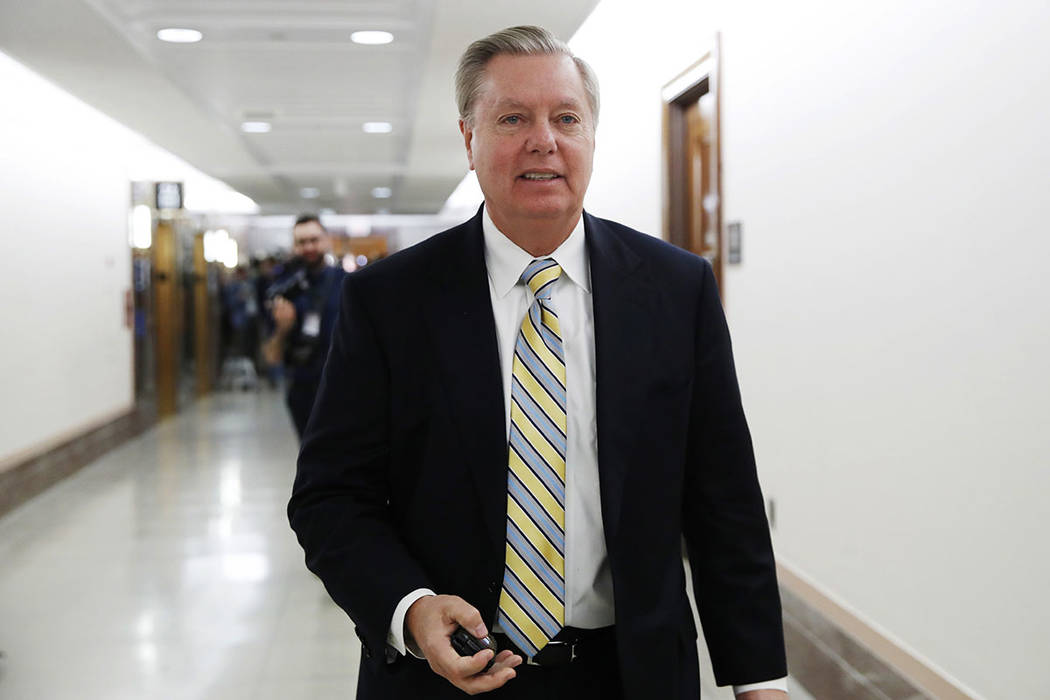Senators target FBI’s Russia probe tactics — ANALYSIS
WASHINGTON — In the past two weeks, cable news has been consumed with the feud between Republicans and Democrats on the House intelligence committee.
The committee released a declassified five-page memo by Chairman Devin Nunes that questioned the “legitimacy and legality” of methods used in the FBI’s investigation into Russian mischief in the 2016 election. Now Democrats are pushing to release a 10-page rebuttal, though the White House said Friday that President Donald Trump is “unable” to declassify the memo because of national security concerns.
Still, the real action in the past week came from two Senate committees that released information that should give readers pause about the FBI’s conduct during its Russia probe.
On Feb. 5, Senate Judiciary Committee Chairman Chuck Grassley, R-Iowa, released a letter to the FBI co-signed by Sen. Lindsey Graham, R-S.C., that suggested federal officials investigate Christopher Steele, the former British intelligence officer who wrote the infamous Trump dossier, on grounds he lied to the FBI. (They released an earlier version in January, but the new version had fewer redactions.)
The letter argues that either Steele lied to the FBI about talking to the media when he was not supposed to or that the FBI knew Steele had talked to the press in violation of protocol and covered up for him. At best, FBI officials were gulled. At worst, they deliberately withheld information that could have halted their investigation.
This is Washington, so not telling the truth about leaking might seem pretty routine.
Max Bergmann, a senior fellow at the left-leaning Center for American Progress, said talking to the media when you are not supposed to is “like every politician in Washington.” If Steele lied about it, to Bergmann it’s “a little bit like a jaywalking ticket.”
But as Grassley and Graham said, lying to the FBI is a crime in this country.
The FBI charged Trump’s first national security adviser, Michael Flynn, with lying to federal officials. He pleaded guilty.
If Steele did not tell the FBI that he had talked to the media, that presents a different problem. It would mean that the FBI was not leveling with the court when it sought a warrant under the Foreign Intelligence Surveillance Act to spy on Carter Page, a former foreign policy adviser to the Trump campaign.
According to Grassley and Graham, a surveillance warrant filed after a Sept. 23 story in Yahoo News stipulated that “the FBI does not believe that (Steele) directly provided” information for the story. Michael Isikoff, author of the Yahoo story, later revealed that Steele was his source.
On Wednesday, Senate Homeland Security and Governmental Affairs Committee Chairman Ron Johnson released a report that hit “high-level FBI officials” for their behavior in the probe of Hillary Clinton’s use of a private email server.
Private texts between FBI Deputy Assistant Director Peter Strzok and FBI attorney Lisa Page, which were reported previously, have laid bare their anti-Trump and pro-Clinton views of the couple, who were having an affair and texting each other on government phones.
Of course, FBI agents are entitled to their political opinions — even when they are investigating political figures.
But Strzok’s judgment was so spectacularly bad that special counsel Robert Mueller removed him from the Russia probe after Inspector General Michael Horowitz showed him the texts in July. The problem was clear: The FBI lovebirds seemed unable to control their feelings about Trump. And that is a problem.
Strzok also worked on the Hillary Clinton email investigation, the one in which FBI Director James Comey drafted a statement exonerating the 2016 Democratic presidential hopeful before the FBI interviewed her. In May, Trump fired Comey.
Deputy Director Andrew McCabe recused himself in the Clinton probe not from the get-go but on Nov. 1, 2016. Former Virginia Gov. and Clinton ally Terry McAuliffe had donated some half a million dollars to McCabe’s wife’s campaign for a Virginia state Senate seat. Recently and rather abruptly, McCabe retired from the FBI.
Some might say Strzok was yanked from the Trump Russia probe and McCabe is gone, so the system works. But a larger question remains: Why does the same cluster of names keep popping up in political investigations?
Aren’t there any good FBI agents in Kansas?
“It makes no sense to me at all,” Rep. Chris Stewart, R-Utah, a member of the House intelligence committee, said of the choices to work on the Clinton and Trump probes. Stewart added, it’s not as though Strzok and Page made a secret of their politics.
Throw in the FBI’s applications for FISA warrants with the dubious claims about Steele not talking to the media, and Stewart sees “abuses of power by people in very powerful positions in the FBI.”
When the Johnson committee report disclosed that
Page texted Strzok on Sept. 2, 2016, that former President Barack Obama “wants to see everything we’re doing.” The Trump corner wondered exactly what that meant.
“My understanding of that is that the president (Obama) is about to go see Vladimir Putin,” Bergmann explained, and wanted to know the latest on Russian mischief. “If we’re going to accuse a world leader, we don’t want to go in thin.”
Probably Bergmann is right. But really, there’s only one way to know: Release the Democrats’ rebuttal, which could still happen, then release the FISA warrant applications.
Contact Debra J. Saunders at dsaunders@reviewjournal.com or 202-662-7391. Follow @DebraJSaunders on Twitter.

























